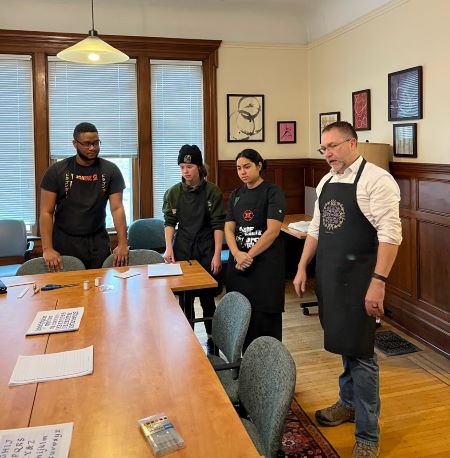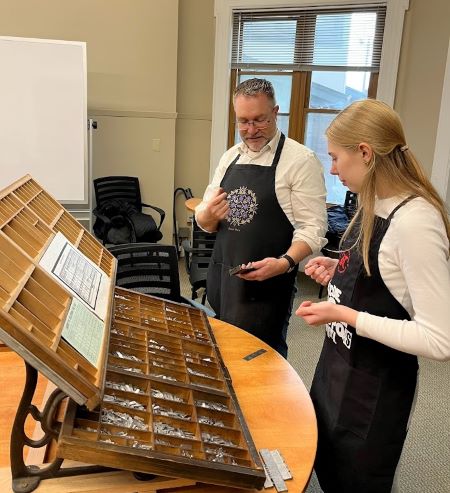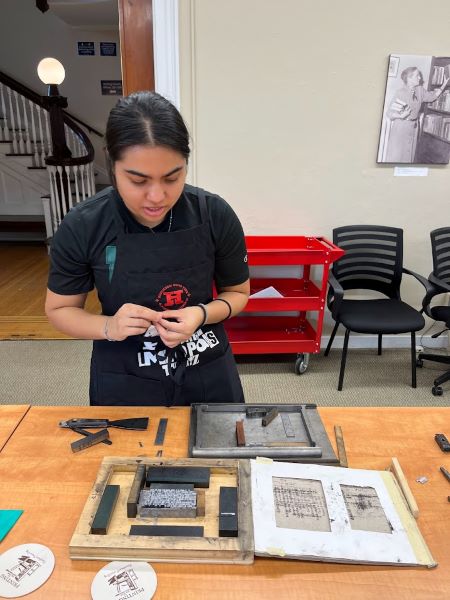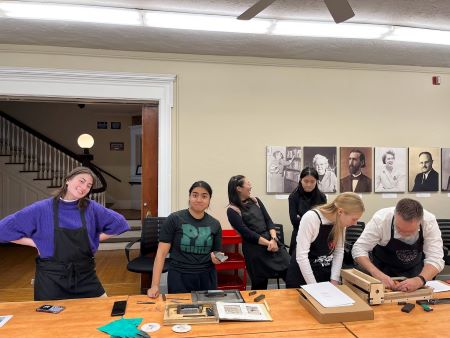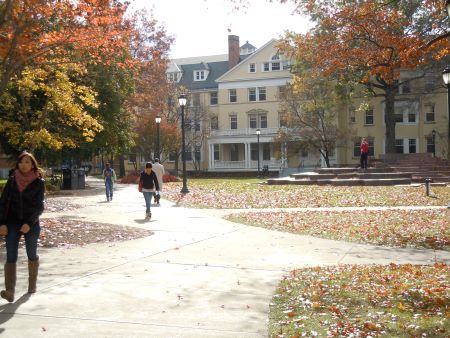Letter from the Chair
One recent day in Guilford House, right around the fall break, I walked into the Parlor to find small clusters of students writing together. I recognized some from my visit to ENGL 300: English Literature to 1800 a few weeks before. Charlie Goyal, who is the department’s undergraduate student assistant, called me over to see what she was writing. It was a collectively composed “country-house poem,” modified to the scale of Guilford House and channeled through a self-consciously gothic mode. Think Haunting of Hill House crossed with “To Penshurst,” and in couplets. No manor lord; plenty of spooky basement. But what it signaled to me was that, like the country-houses of Jonson’s peers, Guilford stands for much more than a physical location—it is a site for the gathering and collecting of disparate materials, practices, histories, and languages. A house that contains multitudes.
Looking ahead, I’m happy to say that 2023 opens the doors of Guilford and Bellflower to some new visitors. We’re thrilled to welcome novelist Garth Greenwell as the Stonum Writer-in-Residence for the week of February 13th. The Stonum Lecture in Poetics will be delivered by Jahan Ramazani on March 31st at 3:15 PM. Other guests include Gordon Hutner, editor at American Literary History and Oxford University Press, and Adrienne LaFrance, editor of The Atlantic. And that’s just a small sample of the schedule, which ranges in topics from eighteenth-century literature to digital humanities to a new biography of the poet Amy Clampitt. We will also be seeking more permanent faculty members: as I write this, English is in the process of hiring for the Shirley Wormser Chair of Journalism and Media Writing.
Our final colloquium event this fall was the Edward S. and Melinda Sadar Lecture in Writing in the Disciplines. Dr. April Baker-Bell spoke about linguistic justice and anti-racist pedagogies to a full house of over thirty undergraduates, graduates, and faculty. New colleagues from History sat next to first-year students from English and Classics. Earlier in the week, the Sigma Tau Delta English honors society formed its executive board. Later that weekend, Literature, Editing, and Design (LED), the student-run literary and art magazine, held a poetry slam. In other words, Guilford and Bellflower are places where things are made, whether that means pedagogical practices or poems. Or even books themselves: students like Tychicus McClendon are learning how to use the printing press in the New Gutenberg Annex, which has prompted fresh calls for a future course.
This fall, as the pandemic receded, we opened the house: to new ideas and questions, to new faculty and students, to new classes and communities. It was as common to find dog-eared copies of Milton as of New Black British Poetry. If I were a first-year English BA student, I might be cramming for a film exam in the morning and crowding into a lecture on poetry and photography in the afternoon. When I asked Veronica Maciag (English and Computer Science, 2026) why she wanted to be an English major, she responded: “English is the only thing that I’ve always known to be there for me– whenever and wherever.” What Veronica says is quite literally true: faculty in English reach students wherever they are across the university, from Foundations and First seminars to Capstone supervision. I would hope that, just as Veronica finds herself welcomed in Guilford, she’ll bring CWRU English with her, whenever and wherever it might be needed.
–Walt Hunter
Wayzgoose at the Writers House: A Fall Showcase of Our Letterpress
Department News
On November 14th, Cara Byrne presented “Why Adults Should Read Children’s Books” at the Noble Neighborhood Library.
Michael Clune presented “William James and Aesthetic Education” at Yale University in October.
Leah Davydov was interviewed in a recent New York Times article about Dracula Daily.
Mary Grimm has a new flash story in Milk Candy Review.
Walt Hunter has been appointed by The Atlantic as contributing editor of poetry
Megan Jewell’s book, Redefining Roles: The Professional, Faculty, and Graduate Consultant’s Guide to Writing Centers (Jewell, Megan Swihart and Joseph Cheatle, editors, Utah State University Press, 2021), has been nominated for the IWCA (International Writing Center Association) 2022 Book Award.
Dave Lucas has three poems forthcoming in the Winter issue of the Virginia Quarterly Review.
William Marling‘s article “Bukowski: The Shooting” has been published in American Literary History (Oxford University Press).
Marilyn Mobley served as faculty host for the Siegal Lifelong Learning Center’s travel education trip to Egypt and the Nile Valley (the trip was in partnership with CWRU Alumni Relations). She delivered two lectures–“Egypt in Africana Studies” and “Egyptian Rituals of Death and Dying.” Mobley delivered the second lecture on their boat (known as a dahabiya) as they sailed down the Nile from Cairo and Luxor to Aswan. The trip was from September 29th-October 12th.
Brad Ricca’s graphic novel with Courtney Sieh, Ten Days in a Mad-house, was named one of the New York Public Library’s Best New Comics of 2022 for Adults.
Cammy Ring‘s essay on Emily Dickinson, “Precisely Knowing Not: Emily Dickinson and Generative Negation,” has been accepted by ELH.
A bilingual Spanish-English edition of Robin Beth Schaer’s poetry book Shipbreaking will be published in early 2023 by Komorebi Ediciones in Chile. The collection of poems will be titled Naufragio in Spanish and translations for the book will be done by María Agustina Pardini and Elenora González Capria of Argentina.
Lindsay Turner signed a contract with the University of Chicago Press to publish her second collection of poems, The Upstate, which will be published as part of the press’s re-launched Phoenix Poets Series in fall 2023.
Thrity Umrigar was on the panel “Hurry Slowly: Writing a Page Turner with Depth” at Literary Cleveland’s Inkubator on Saturday, September 10th.
Tilting at Windmills, or Creating the Lennox Bibliography Project
I’ve always been interested in old books and book history. Between an interest in small-press publishing in my pre-college life and finding my research home in 18th-century British literature in grad school, I always wondered about the choices that were made and the collaborations that took place between writing a book and getting it into print. A trip to the University of Virginia’s Rare Book School and the Introduction to Descriptive Bibliography course (fondly known as “desc bib boot camp”) not only cemented my interest in book history, but also introduced me to the potential of bibliographical research in my own work. I left the course with as many new questions as I had answers, and ended up coming back to those questions repeatedly as I finished my dissertation. By the time I’d recovered from the process enough to think about where my research might go in the future, I realized that the questions had become a roadmap for my research, albeit a long and winding one through unfamiliar territory. The Lennox Bibliography Project is the result.
The Lennox Bibliography Project is a born-digital initiative. The goal is to provide an online, open-access descriptive bibliography of the work of Charlotte Lennox (1729-1804). Lennox was a notable British novelist, best known today for her novel The Female Quixote. She was also a literary critic, playwright, poet, editor, and translator. Lennox was celebrated during her lifetime and considered one of the leading literary women of her age. Samuel Johnson and Samuel Richardson were among her friends, and she was acquainted with Elizabeth Montagu and the other Bluestockings (though not considered part of that circle). She was the primary financial support for her family with her writing work, and her books and translations stayed actively in print in England and beyond for her lifetime and nearly fifty years more.
Currently, the Lennox Bibliography Project is in its early stages. Stage 1.1 consisted of identifying and mapping extant copies of Lennox’s published works and their locations by using the English Short Title Catalog (ESTC) and Worldcat/OCLC in custom Google Maps. Between the two, I was able to compile a significant if incomplete list of copies, limited to libraries and dependent on correct listings. Stage 1.2 involves converting the data into a spreadsheet and verifying each copy, removing duplicates, clarifying where copies are held, and adding any missed entries. 1.2 is currently in progress, with a website that includes copies of the maps, a blog, and which will eventually be the home of the interface for the bibliography.
Step 2, which began this summer, involves observing and documenting as many of these existing copies as possible. Kelvin Smith Library Special Collections is my home base and starting point for my research. In addition, however, I visited the Eberly Family Special Collections at Penn State University this past August and got to look through their Lennox holdings, kicking off the in-person research portion of the project. Following/during that portion, work will begin creating a user interface for scholars to access the material and search for specific titles, publishers, and years of publication among other details.
Bibliography has changed considerably since its heyday in the 20th century. While prior bibliographic scholarship focused primarily on authors in the traditional canon, primarily white men, and on finding/creating the ideal copy of a work, current work focuses on women, people of color, and non-Western book history. My goals are to uncover Lennox’s scholarship and translation work beyond the novels she is best known for now, and to look into where her books ended up and how they got there. I’m as interested in the provenance of individual copies and signs of personal use as I am in looking for printing errors or inconsistencies. The ability to house this work online opens up affordances in terms of the types of material, images, and access that were unavailable with traditionally published bibliographies, as well as in terms of who will be able to access this material, reaching beyond traditional academia and hopefully providing a model and materials for others to create similar projects. In the meantime, I’ll keep pushing forward and tilting at my proverbial bibliographic windmill, one bit of data entry at a time.
— Michelle Lyons-McFarland
The Lennox Bibliography Project
http://lennoxbibliographyproject.wordpress.com
“My readers may depend upon it, I will always be as witty as I can, as humorous as I can, as moral as I can, and upon the whole as entertaining as I can.”
–Charlotte Lennox, 1760, from the introduction to her periodical The Lady’s Museum
Faculty Publications
Dreaming at the Well: Poems, Stories, and Essays by William Powell Jones. Edited by Nicholas Root Jones.
Nicholas Jones has collected his father’s poems, stories, and essays, as well as listing his already published or collected scholarly work. In his introduction, he says: “Sorting things after my parents died, I found a six-inch stack of manuscripts in a drawer of Dad’s desk—thirteen stories, two of them quite long, and most in multiple versions, accompanied by some fifty poems. Most were typed (a manual typewriter stood on a typing stand next to his desk) with corrections and revisions in pencil. Some were in longhand, even written in blank ‘bluebooks’ . . . . This stack moved with me from Ohio now to California, where in the winter of 2021-22 I finally read these stories and poems.”
William Powell Jones was a professor and dean at Western Reserve University, as well as chair of the English department. His son, Nicholas Root Jones, is a Professor of English (Emeritus) at Oberlin College.
English Alum Receives the 2022 Distinguished Graduate Alumnus Award
Kent Cartwright (’79) received the 2022 Case Western Reserve University College of Arts and Humanities Distinguished Graduate Alumnus Award, presented by Dean Joy Ward at an awards banquet on October 8th during homecoming weekend. Kent is Emeritus Professor of English at the University of Maryland, College Park. The award recognized his career as a Renaissance scholar and an academic leader. The announcement of the award can be found here.
Alumni News
Will Allison (’91) will be leading a panel at the 2023 AWP (Association of Writers & Writing Programs) conference & bookfair in Seattle: “Is an Independent Editor Right for You?”
Danny Anderson (’12) has started a substack discussing movies, music, books, teaching.
Allan Benn (’83) is a Professor Emeritus at East Stroudsburg University of Pennsylvania (35 years, no less!), which is a teaching school in the PA State System of Higher Education, and was awarded the title of Distinguished Professor there in 2006. He got his MA and PhD in English at CWRU, with Roger Salomon as his advisor for his dissertation on Hawthorne. For the second year, he’s teaching in the ESem program at Bryn Mawr College, which offers a set of required topic centered first year writing courses. Last year, his course examined solitude; this year, it’s romantic love. Both courses used a mix of various forms of nonfiction, including some science, and relevant creative writing, both prose and poetry.
Gerry Canavan (’02 ) is one of the editors of Uneven Futures: Strategies for Community Survival from Speculative Fiction. Edited by Ida Yoshinaga, Sean Guynes and Gerry Canavan.
Shelley Costa (’83) has a new mystery out—Evil Under the Tuscan Sun.
Andi Cumbo-Floyd (’01) writes under the name ACF Bookens. Here is the cover of her new series.
Iris Jamahl Dunkle (’10) read with Brenda Hillman and Robert Hass at Bacchus Landing in Healdsburg, California.
Nivi (Sharan) Engineer (’94) and Nital Subhas (Administrative Director of Clinical Research Education Programs, Department of Population and Quantitative Health Sciences, CWRU School of Medicine) just released this children’s book about Holi, the Indian Festival of Colors: Can We Throw the Colors Yet?
Alum (’64) Kathleen McKinley Harris’s poem “Transformation” is included in the anthology Imperfect II, April 2022; editor Tabatha A. Yeatts. She recently had her story, “Secret of the House Highest on the Hill Near the Diggins” accepted for performance by Bridgeside Books, Waterbury, Vermont, by professional actors Mark Nash and Kathryn Blum. She is also the author of the chapbook Earth Striders from Finishing Line Press.
At a month short of her 95th birthday, Dr. Audrey Lavin (’84) is busy with her work on the Canton, Ohio, planning commission, proof reading a soon to be published political memoir, and reading Willa Cather novels that seemed to have been skipped over during her academic days, but are happy fodder for her reading group aptly titled ‘our mutual friends.’
Jeff Morgan (’99) is having good fortune in his newest creative outlet, acting. He has a dual role as the Teacher/Jan in this cutting edge satire of silent retreats–Small Mouth Sounds–at the Lake Worth Playhouse in Lake Worth Beach, Florida.
Alum Rick Pender‘s writing has traveled a long and circuitous path since he earned his MA (1972) and PhD (1980), as a medievalist. His most recent publication is THE CINCINNATI BENGALS: AN ILLUSTRATED TIMELINE.
Aaron Perine (’16) just interviewed Black Panther: Wakanda Forever director Ryan Coogler and had his review of the film featured in the film’s marketing campaign.
Brad Ricca is on the podcast Stealing Superman about the theft of Nicolas Cage’s copy of Action Comics #1.
Carrie Shanafelt (’03) has a chapter in The Oxford Handbook of Samuel Johnson.
Macin Sheeder (’22) participated in a summer internship through the Cleveland Foundation’s annual program. The Foundation published a feature about her experience (including a few shoutouts to her English major). You can read the full article here.
Marie Vibbert (’98) gave a reading at Mac’s Backs in November.
Alum (’88) John Vourlis‘s documentary feature film The House Next Door was selected to screen at the 13th annual Chagrin Documentary Film Festival in October. The film is a feature length documentary about how the foreclosure crisis of 2008 ripped through the Greater Cleveland area,
Send Me Your News
If you have news you would like to share in a future newsletter, please send it to managing editor Susan Grimm (sxd290@case.edu). If you wish to be added to our mailing list, just let us know. The department also has a Facebook page on which more than five hundred of your classmates and profs are already sharing their news. Become a member of the community and post your own news. We want to know. The department will be posting here regularly too—news of colloquiums, readings, etc. We tweet @CWRUEnglish. We are cwruenglish on Instagram.

